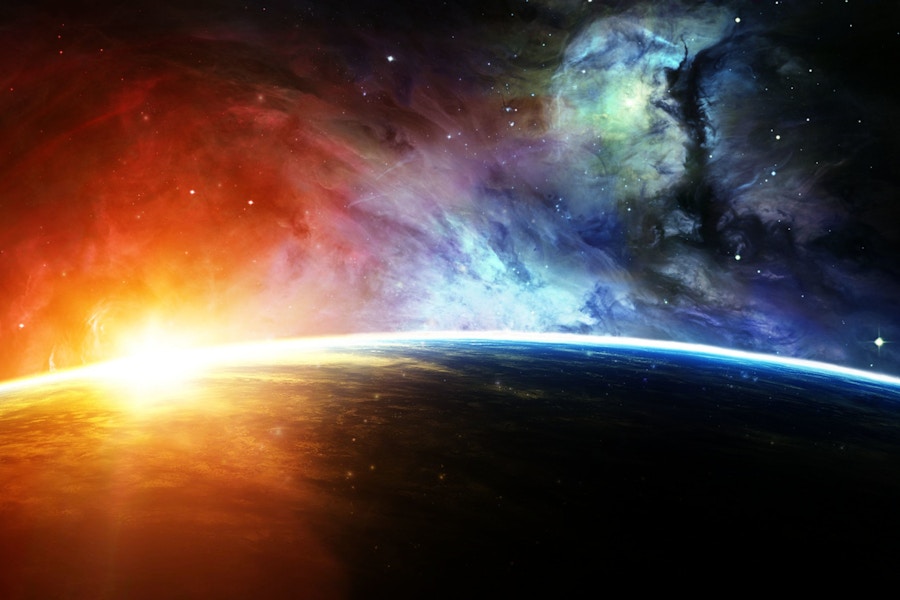Last week we began looking at the first of three significant emphases in the biblical creation narrative that help us engage with the mystery of God. Consider with me a second insight from Genesis 1, one that requires some development, but is an extension of what we pondered last week about the absolute and independent nature of God. Since God is absolutely independent, brooking no rivals or associates of any sort, the writer of Genesis insists that the sovereign rule of God extends to all things and to all kinds of things, because everything that exists depends upon God alone for its existence. In the beginning, God created not just some things, a certain selection of items, but “the heavens and the earth” — that is, everything whatsoever.
The story of creation in Genesis stands in sharp contrast to prevailing cultural expectations, where a god was likely to be associated with one isolated natural phenomenon (say, the sun) or with one specific geographical location (say, the Nile River). No such narrow limitations apply to God the Creator. In fact, even the barest association with them seems to be avoided in Genesis.
Have you noticed the author uses the unusual expression “two great lights” in Genesis 1:16 to describe the sun and the moon that God creates. Why not simply say that God made the sun and the moon? Perhaps because the common Hebrew names for sun and moon (shemesh) and (yareach) would easily be linked to the sun god (Shamash) and the moon god (Yarih). Genesis knows nothing of localized deities like these, for the one true God is Lord not just of sun or moon but of all creation.
We see this same universal divine rule in the biblical account of God’s relationship to certain elemental powers in creation that the ancient world regarded with reverence or dismay. For example, fertility was a pervasive sacred force for all Canaanite religions. The gods might make use of this force, but it is nevertheless an independent power that they did not create and could not fully control. By contrast, fertility is pictured in Genesis as a simple gift of God, a conditional capacity that peacefully serves God’s purposes by allowing plants and animals to reproduce and fill the earth (vv. 11 – 12, 22). Or again, note the reference in Genesis 1:21 to “the great sea monsters,” the classic illustration in the ancient world of raging, destructive power. But here in Genesis, these “monsters” are not rebellious enemies that God must subdue; they are simply among the many creatures to which God gives life. Created by God, they are subject to his unqualified control.
Genesis proceeds to show God’s rule not only over every creature in the cosmos, but also over other kinds of rule within the cosmos. Although Adam and Eve are portrayed as the crown of creation, and are thus granted a much more noble position in the biblical story of creation than in ancient Near Eastern alternatives (where human beings are generally presented as an irritation to or as menial servants of the gods), it remains clear that human nobility is rooted in humanity’s subordination to God. All of the authority exercised by the man and the woman is derived from their status as the “image” of God, and this derivation is confirmed when God himself commands his image-bearers to “subdue” the earth and “rule” over its other creatures (Gen. 1:28). Subduing and ruling are not the natural drive of one species to dominate another; neither are they the autonomous effort of a particularly gifted creature to unseat the Creator or compete with his universal reign. Instead, human rule serves and reflects divine rule. It is part of the ordered plan of the Creator whose uncontested will all of creation follows.
“Oh, Lord how great you are. You take our breath away. And you have made us your image-bearers. Left to ourselves, the gift of your image is too much for us. Indeed, we have cracked it. Yet through your grace the image can be restored, the cracks erased. Heal us, Lord, for your mercy is great.”
Catch up with the eleven previous installments in this series, as well as all of Chris’s other blog posts, at Conversations with Chris.
This series has been adapted from Steven D. Boyer and Chris Hall’s The Mystery of God: Theology for Knowing the Unknowable. Hungry for more? Please visit Baker Academic for more information.


